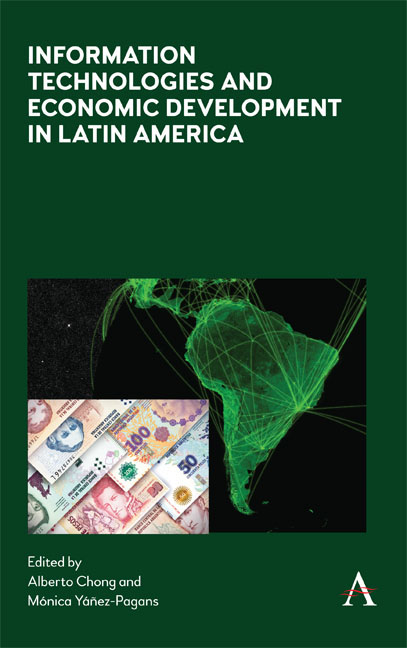Book contents
- Frontmatter
- Contents
- List of Illustrations
- List of Editors
- List of Contributors
- Acknowledgments
- Chapter 1 Information Technologies in Latin America
- Chapter 2 The Impact of ICT in Health Promotion: A Randomized Experiment with Diabetic Patients
- Chapter 3 The Impact of ICT on Adolescents’ Perceptions and Consumption of Substances: Evidence from a Randomized Trial in Uruguay
- Chapter 4 Text Messages as Social Policy Instrument: Evidence from a Randomized Controlled Trial with Internal Refugees in Colombia
- Chapter 5 Radio and Video as a Means for Financial Education in Rural Households in Peru
- Chapter 6 Digital Labor-Market Intermediation and Subjective Job Expectations
- Chapter 7 From Cow Sellers to Beef Exporters: The Impact of Traceability on Cattle Farmers
- Chapter 8 The Labor Market Return to ICT Skills: A Field Experiment
- Chapter 9 Soap Operas for Female Micro Entrepreneur Training
- Index
Chapter 7 - From Cow Sellers to Beef Exporters: The Impact of Traceability on Cattle Farmers
Published online by Cambridge University Press: 30 April 2020
- Frontmatter
- Contents
- List of Illustrations
- List of Editors
- List of Contributors
- Acknowledgments
- Chapter 1 Information Technologies in Latin America
- Chapter 2 The Impact of ICT in Health Promotion: A Randomized Experiment with Diabetic Patients
- Chapter 3 The Impact of ICT on Adolescents’ Perceptions and Consumption of Substances: Evidence from a Randomized Trial in Uruguay
- Chapter 4 Text Messages as Social Policy Instrument: Evidence from a Randomized Controlled Trial with Internal Refugees in Colombia
- Chapter 5 Radio and Video as a Means for Financial Education in Rural Households in Peru
- Chapter 6 Digital Labor-Market Intermediation and Subjective Job Expectations
- Chapter 7 From Cow Sellers to Beef Exporters: The Impact of Traceability on Cattle Farmers
- Chapter 8 The Labor Market Return to ICT Skills: A Field Experiment
- Chapter 9 Soap Operas for Female Micro Entrepreneur Training
- Index
Summary
Introduction
In the past five decades Latin America experienced on average slower growth than the rest of the world but Africa. Within the developing world, Latin America and Africa fell behind the progresses made by Asian countries. Blyde and Fernandez-Arias (2005) documented that these differences are mainly due to total factor productivity changes over time. Most Latin American countries have comparative advantages in agriculture and, therefore, in order to boost growth they should apply techniques that improve agricultural productivity. Developing countries with comparative advantages in agriculture are disadvantaged by the fact that the specificity of their agroecological features and contexts leaves them less able than other regions to benefit from international technology transfers (World Bank, 2008). Therefore, unlike the transfer of industrial technology that is complex but more standardized, agricultural technology often requires local investment in adaptation and innovation.
In this chapter we evaluate the implementation of TRAZ.AR, a traceability system to electronically identify and track the production cycle of cow herds in small/ medium rural enterprises (SMEs) in Argentina. Cattle traceability is a requirement to access the high value European market. To the best of our knowledge this is the first attempt to assess the effect of traceability at the farmer level, and more importantly to evaluate an ICT intervention to increase productivity in cattle farms.
There are compelling reasons to expect significant economic development from the adoption of ICTs in cattle activities. First, technology is a means of adding value to production and, therefore, would increase the price consumers pay. Second, the introduction of technology can improve the quantity and quality of information available, reducing asymmetric and imperfect information in markets. The use of this valuable data can increase productivity which might be a driving force for growth in agriculture.
In the particular case of beef production, anonymity of the open market limits the ability to create incentives to improve product quality. Traceability identifies the animals and stores all the information related to them in a central server that could be audited, engendering a differentiation of traced products. Furthermore, traceability systems trigger a “learning by tracing” process because the information generated helps to improve production and trading decisions.
- Type
- Chapter
- Information
- Publisher: Anthem PressPrint publication year: 2020



